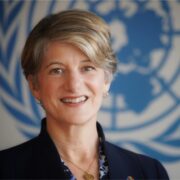How can we accelerate achieving the UN SDGs through commercially led capacity-building partnerships with emerging spacefaring nations?
United Nations Sustainable Development Goal #17 (Partnerships for the Goals) is critical for emerging spacefaring nations to access the benefits of space to help combat the impacts of climate change and meet the rest of their SDGs by 2030. The commercial space sector, as well as established spacefaring nations and academia, have vital roles to play in helping these nations access space.
In collaboration with the UN Office of Outer Space Affairs (UNOOSA) and Space Foundation, this project seeks to study the feasibility of commercially led capacity-building partnerships. Specifically, this project seeks to understand the drivers, benefits, economic impacts, and obstacles to partnerships between commercial space companies, academia, and emerging spacefaring nations to implement space-based solutions that address those nations’ governmental priorities. The project further seeks to identify mechanisms that would facilitate and scale matchmaking between providers and beneficiaries.
The initial work will be presented by the outgoing undergraduate student team at the 2024 International Astronautical Congress in Milan. This project seeks to build on this initial research to further identify mechanisms that would facilitate and scale matchmaking between providers and beneficiaries.
Key accomplishments
- Our undergraduate contributors mentored by Jessica Rousset and Chase Kassel (ASU) and in collaboration with UNOOSA and Space Foundation selected to present the project at International Astronautical Congress 2024 in Milan.
Team lead:
Jessica Rousset
Funding years:
2024-2025
2023-2024
Team members
Jessica Rousset
Director
Expertise Areas:
Biotechnology, Intellectual Property, Innovation, Entrepreneurship, Business Process Management, Strategic Planning, Business Model Innovation, Leadership, Corporate Strategy, Marketing, Biomedical Engineering, Technological Entrepreneurship and Management












